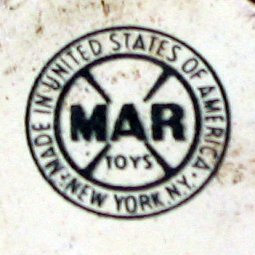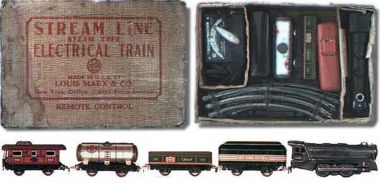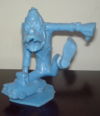Louis Marx and Company
Louis Marx and Company was an American toy manufacturer from 1919 to 1978. Its boxes were imprinted with the slogan, "One of the many Marx toys, have you all of them?"
The Marx logo was the letters "MAR" in a circle with a large X through it, resembling a railroad crossing sign. Because of this, Marx toys are sometimes misidentified as "Mar" toys.
Marx's toys included tinplate buildings, toy soldiers, toy dinosaurs, mechanical toys, toy guns, action figures, dolls, doll houses, toy cars, and HO scale and O scale toy trains. Marx's less-expensive toys were extremely common in dime stores, and its larger, costlier toys were staples for catalog retailers such as Sears and Montgomery Ward, especially around Christmas. Although the company is now largely forgotten except by toy collectors, several of its toys remain well known. Rock'em Sock'em Robots, introduced in the 1960s, remained popular for years and has been reintroduced by several different companies. Its last hurrah was the Big Wheel ride-on pedal toy, which was introduced in 1969 and became one of the most popular toys of the 1970s.
Founded in 1919 in New York City by Louis Marx and his brother David Marx, the company's basic policies were "Give the customer more toy for less money," and "Quality is not negotiable," which made the company highly successful. Initially the company had no product designs and no manufacturing capacity, so Marx raised money by positioning itself as a middle man, studying available products, finding ways to make them cheaper, and then closing a sale. Funds raised from these effort proved sufficient to purchase tooling for two obsolete tin toys—called the Alabama Minstrel Dancer and Zippo the Climbing Monkey—from toymaker Ferdinand Strauss, one of Louis Marx's former employers. With subtle changes, Marx was able to turn these toys into hits, selling more than 8 million of each within two years. Marx then bought the company it had subcontracted to manufacture the toys. By 1922, both Louis and David Marx were millionaires. Initially Marx produced few original toys, but was able to predict what toys would be hits and manufacture them less expensively than the competition. The yo-yo is an example: Although Marx is sometimes wrongly credited with inventing the toy, Marx was quick to market its own version, and during the 1920s sold an estimated 100 million of them.
Unlike most companies, Marx's revenues grew during the Great Depression. By 1937, the company had more than $3.2 million in assets ($42.6 Mil. in 2005 dollars), with debt of just over $500,000. Marx was the largest toy manufacturer in the world by the 1950s. In a 1955 article, Time Magazine proclaimed Louis Marx "the Toy King," and that year, the company had about $50 million in sales. Marx was the initial inductee in the Toy Hall of Fame, and his plaque proclaimed him "The Henry Ford of the toy industry."
At its peak, Louis Marx and Company operated three manufacturing plants in the United States: Erie, Pennsylvania, Girard, Pennsylvania, and Glen Dale, West Virginia. The Erie plant was the oldest and largest, while the Girard plant, acquired in 1934 with the purchase of Girard Model Works, produced toy trains, and the Glen Dale plant produced toy cars. Additionally, Marx operated numerous plants overseas.
In the 1960's Marx capitalized on the space toy and robot craze. It produced the Big Loo "Your friend from the Moon" in 1964 and originated the popular Rock 'Em Sock 'Em Robots in 1967.
In 1963, they began making a series of plastic figurines called the Nutty Mads which included some almost psychedelic creations such as Donald the Demon: a half duck half madman, driving a miniature car.
In 1972, Marx sold his company to the Quaker Oats Company for $54 million ($246 Mil. in 2005 dollars) and retired at the age of 76. Quaker owned the Fisher-Price brand, but struggled with Marx. Quaker had hoped Marx and Fisher-Price would have synergy, but the companies' sales patterns were too different. Marx has also been faulted for largely ignoring the trend towards electronic toys in the early 1970s. In late 1975, Quaker closed the plants in Erie and Girard, and in early 1976, Quaker sold its struggling Marx division to the British conglomerate Dunbee-Combex-Marx, who had bought the former Marx UK subsidiary in 1967.
A downturn in the British economy in conjunction with high interest rates caused Dunbee-Combex-Marx to struggle, and these unfavorable market conditions caused a number of British toy manufacturers, including Dunbee-Combex-Marx, to collapse. By 1978 the Marx brand disappeared, and Dunbee-Combex-Marx filed for bankruptcy and was liquidated in 1980. The Marx assets were then liquidated, with many of the patents and molds going to Mego Corporation, another famous maker of dime store toys, and a large number of them going to Canadian toy maker Aurora.
The rights to some of Marx's toys are now owned by other companies, and some of its former products are still in production. Marx Toys, Inc., was sold and transformed into 'Marx Toys & Entertainment, Inc.' Marx Trains, Inc. produces lithographed tin trains, both of original design and based on former Louis Marx designs. K-Line produces plastic O scale train cars and scenery using former Marx molds, which it markets under its own brand name. Model Power produces HO scale trains from old Marx molds. Rights to the original Marx Big Wheel are owned by KidsWheels, Inc., and Rock 'Em Sock 'Em Robots is claimed by Mattel. Marx's toy soldiers and other plastic figures are in production today in China for the North American market and are mostly targeted at collectors, although they sometimes appear on the general consumer market, particularly at dollar stores.
The Marx name itself has changed hands several times as well. Despite the similar names, neither of the Marx-branded companies of today have any connection to the original Louis Marx and Company.
The original Marx toys are highly regarded by collectors.



